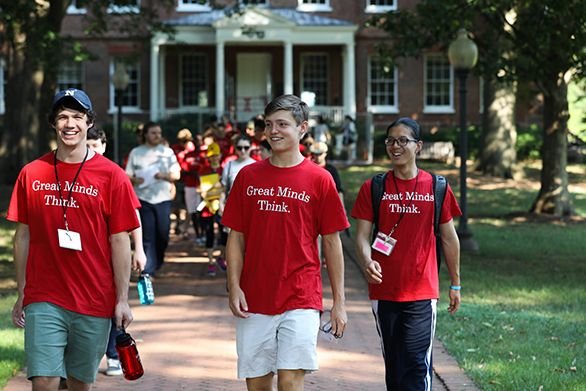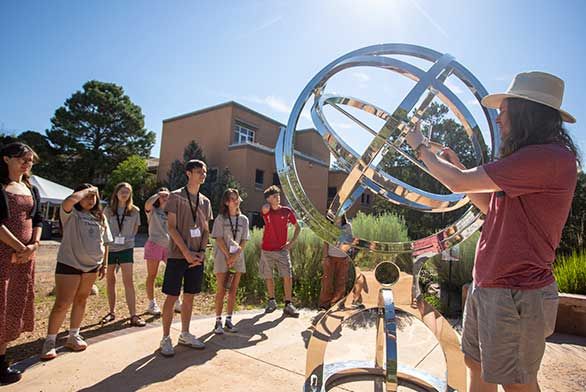Summer Academy Provides High School Students with a Taste of the St. John’s Experience
By Helen Wagner (A26) | November 26, 2025
It was a balmy June evening in Annapolis, Maryland, on the banks of College Creek, and the St. John’s College Hodson Boathouse was full of conversation and laughter. Students sat at tables sharing meals and making jokes about philosophy. The undergraduates were away until fall, but the campus was far from empty: Summer Academy was in session. High schoolers filled the classrooms that week, discussing authors like Descartes, Dickinson, and Darwin in seminars and tutorials. On their final evening at St. John’s that night in the boathouse, they shared a formal dinner and concluded festivities by swing dancing in the Great Hall.

Summer Academy is a St. John’s Great Books program for high schoolers held every year in June and July. Three week-long sessions in Annapolis and Santa Fe balance academic rigor with college tradition and community to give students a taste of the St. John’s experience. “It’s way more than a recruitment tool,” says Audrey Brazeel, the director of Summer Academy. “It’s about sharing our Program and methods. Enrollment is the last step, but the first step is knowledge, communication, and teaching young people.”
There’s no better way to get to know St. John’s than to experience it yourself. “The books are kind of the cornerstone of the Program, and you can see that from the website and the materials, but they’re not what make St. John’s unique,” says James Bates (A29), a current Annapolis freshman who attended Summer Academy as a high schooler. “St John’s is so different. It’s fully discussion-based. If you can’t experience the discussion, it’s a little bit hard to get behind.”
Bates grew up on the grounds of the Naval Academy, right across the street from St. John’s in Annapolis. Although he knew about St. John’s, he didn’t think its unique education style was right for him—that is, until he attended Summer Academy after his junior year of high school. “I thought, ‘Well, why not?’” he says. “I should go check it out and see what it’s like.” By the end of the week, he had completely changed his mind: St. John’s was the place for him after all. He applied Early Decision and was accepted at the beginning of his senior year.
Summer Academy provides a different academic theme for each week. Bates attended the “Consciousness and Mind” session on the Annapolis campus in 2024. The seminar text was Descartes’ Meditations on First Philosophy, and students spent that week reading and discussing some of philosophy’s fundamental questions: “What can we say is real?” “Can we trust our own minds?” “How do we know we exist?”
Along with evening seminars, Summer Academy students participate in two tutorial classes: language and lab. Although the undergraduate program focuses on Greek and French, along with some English poetry, the Summer Academy language tutorial is primarily in English. At the “Consciousness and Mind” session, Bates read English poets like Emily Dickinson, as well as several translated texts from the college’s Eastern Classics graduate program in Santa Fe.
Bates’ lab tutorial looked at Charles Darwin’s book The Formation of Vegetable Mould Through the Action of Worms. Even the science classes at St. John’s are discussion-based— something unfamiliar to many high schoolers— but he enjoyed it. Discussions were paired with hands-on practicums, where students explored Darwin’s writing at the lab bench by observing earthworms. Even something as mundane as the consciousness of worms proved a rich philosophical subject. “It evolved into a discussion of what is uniquely human about emotions,” Bates recalls.
While the summer programs at many universities are run by graduate students and teaching assistants, every class at Summer Academy is run by full-time St. John’s College faculty members. “These are high-level academics,” Brazeel says. “Many of them have multiple PhDs, and they’re teaching high schoolers. The tutors who decide this is how they want to spend their summer are special humans. They can truly see the future of the college.”
“This is the best way of learning I’ve ever seen,” says Grace Burden, a freshman in Santa Fe who attended the “Civil Disobedience” session of Summer Academy there in 2024. “Through talking with people, you can get so much more out of a book than what meets the eye. It can be a challenge, but it’s a rewarding challenge.”

During her weeklong stay in Santa Fe, Burden read speeches by Malcolm X and Martin Luther King Jr. alongside the work of Cato the Younger. In her lab tutorial, she read Galileo with Santa Fe tutor Krishnan Venkatesh. She recalls sitting on a balcony, listening to Venkatesh speak about the senses. She thought about the way she sees the stars, and the way someone else might see them differently.
“I was thinking, how can the slightest perception change your entire worldview? How have I experienced the world differently from somebody else? Everybody is different. It makes me realize there’s so much in this world, including education, that you can get from other people that you’ll never get from yourself.”
Burden’s experience at Summer Academy inspired her to apply to St. John’s. Naturally passionate about learning, she had previously felt disillusioned by her high school experience, but her week in Santa Fe provided her with a taste of just how rich education could be. “I thought, ‘I need to do this,’” she says. “It’s going to change my life.”
“Summer Academy ends up being a stepping-stone for a lot of kids,” Brazeel says. “It propels them into an academic headspace that they were yearning for, but not necessarily getting in high school. It’s beautiful.”
That same week, Burden began her Discussion-Based Application—an alternative to the traditional written application that allows students to showcase their conversational strengths. Now, she’s a freshman in Santa Fe.
“Summer Academy is a key component of our admissions strategy,” says Ben Baum, Vice President of Enrollment. “Nearly a quarter of the freshman class each year attended Summer Academy before they applied to become Johnnies, and it is that experience in seminar, alongside our tutors, and meeting peers who also eagerly devour and discuss books, that convinces so many students that St. John’s is the right fit for four years. There’s no better marketing for the college than actually experiencing it—and that’s what Summer Academy does.”
While different program topics are offered on the Annapolis and Santa Fe campuses, the structure of the week is the same: students attend an evening seminar and two tutorial classes, all of which meet three times. Online sessions are also offered for those who can’t make it to campus or are working summer jobs.
In 2026, Annapolis will host three Summer Academy sessions: “A Week with Shakespeare,” “Sight and Insight,” and “Equality and Inequality.” The “Sight and Insight” week will explore questions of perception and intuition through multiple texts, including Jane Austen’s Sense and Sensibility and Euclid’s Elements. During the “Equality and Inequality session,” seminars on Rousseau will be paired with classes on the Federalist Papers and Archimedes’ analysis of “the law of the lever.”
Santa Fe’s 2026 sessions, meanwhile, are “Wisdom and Wilderness,” “Courage and the Soul,” and “Thinking about Paintings and Poetry.” Through “Wisdom and Wilderness,” high schoolers will explore questions of humanity, conservation, and nature, all while immersed in the enchanting landscape of the American West. They’ll also have the option to extend their week with a day trip through the St. John’s College Outdoor Program.
“Courage and the Soul” will include readings all the way from ancient Herodotus to Charles Portis’ True Grit. The session comes complete with a unique film component, with related screenings offered throughout the week. In “Thinking About Paintings and Poetry,” students will read Homer, Shakespeare, and Wordsworth, and look at paintings by Rembrandt and Bruegel. At the end of the week, they can see Madame Butterfly at the Santa Fe Opera.
According to Brazeel, conversations are ongoing about giving Summer Academy students college credit. Whether or not this comes to fruition, the program remains an integral part of the St. John’s mission, restoring the value of liberal education one student at a time.

